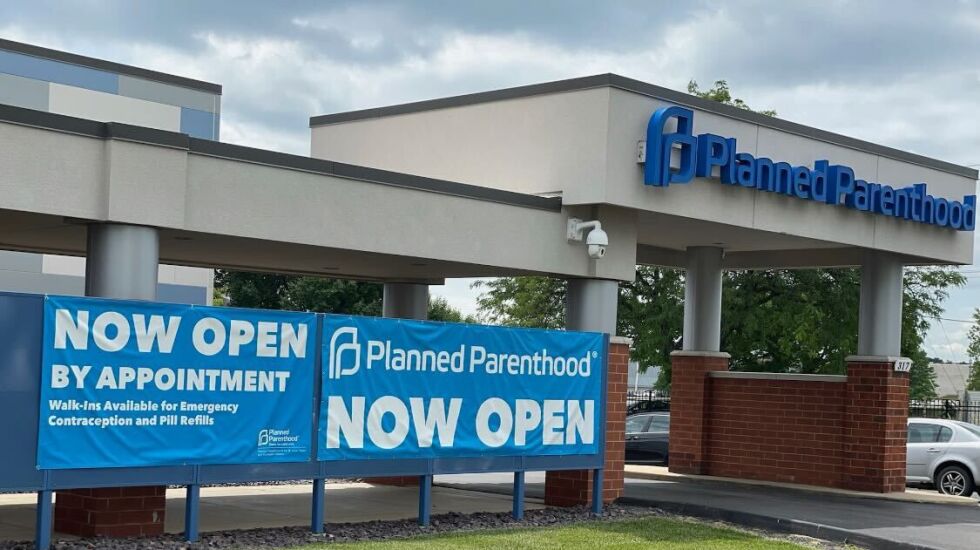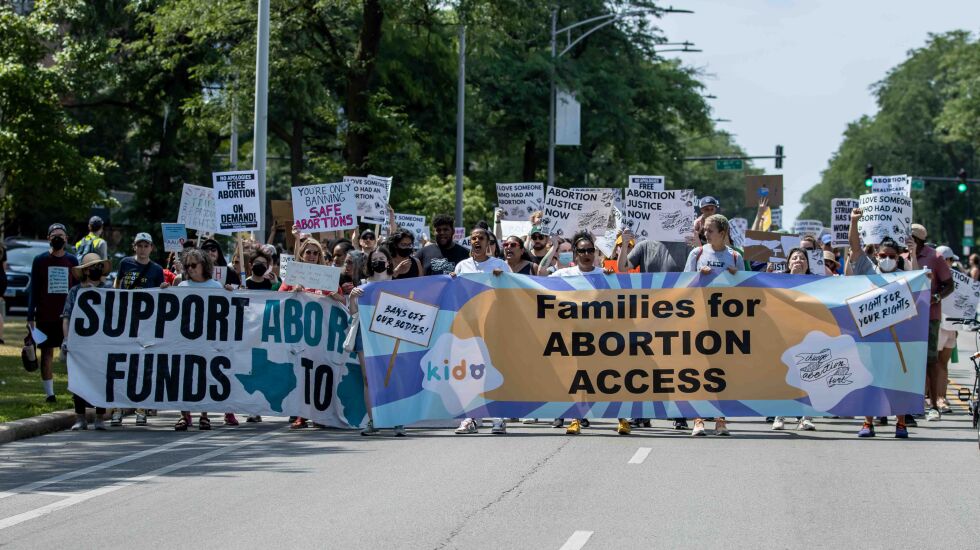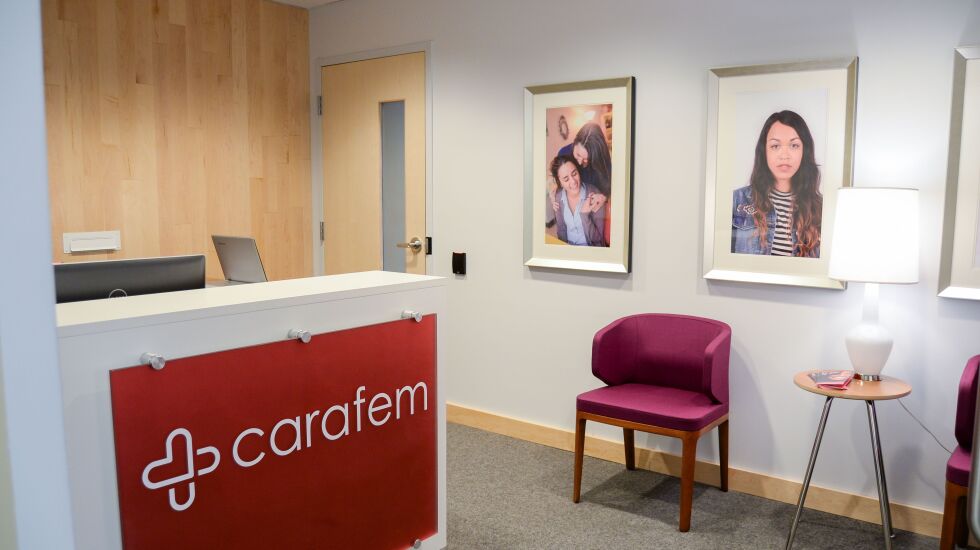
In the past, when someone was seeking an abortion in Illinois, the Midwest Access Coalition might have suggested getting one in the southern part of the state, where hotels are cheaper.
That’s becoming less of an option for the organization, which provides financial, emotional and logistical support for getting an abortion. That’s because of longer waits for appointments, said Alison Dreith, the coalition’s director of strategic partnerships.
“Now, we can’t do that because there’s just no promise of an appointment,” Dreith said. “People are just having to travel much, much further. The cost of travel right now is absurd.”
In the month since the Supreme Court overturned the 1973 landmark Roe v. Wade ruling that legalized abortion nationwide, out-of-state demand has hit southern Illinois particularly hard. Waits at the Planned Parenthood clinic in downstate Fairview Heights have risen from three to four days previously to as long as three weeks, said Bonyen Lee-Gilmore of Planned Parenthood of the St. Louis Region and Southwest Missouri, which operates one of two clinics that perform abortions in that part of the state.
“We’re really holding back the dam of patients who are coming from the South and the lower Midwest,” said Lee-Gilmore, who said the clinic is trying to make sure no one gets turned away.
In other parts of Illinois, there are signs of a growing demand. Abortion remains legal in Illinois, and officials are seeking federal funds in anticipation of seeing more demand from out of state for abortions.
That already was happening even before the high court’s ruling in the Dobbs v. Jackson case.

In 2015, out-of-staters accounted for 3,210 abortions in Illinois, according to the Illinois Department of Public Health. By 2020, the latest figures available, that number was 9,686.
Lee-Gilmore said that, in recent weeks, the downstate Planned Parenthood organization has seen an increase in abortions past 15 weeks of pregnancy — a sign, she said, it might be taking longer to get an abortion.
“We are in a state of a public health emergency,” she said, calling for more state funding and other changes to expand the number of providers that can perform abortions.
Planned Parenthood of Illinois, which operates clinics around Chicago, usually has about 100 appointments for out-of-state patients a month. That number rose to nearly 750 in the week after Roe v. Wade was overturned, said Dr. Amy Whitaker, chief medical officer for the organization. The number of calls its clinics received doubled in the days after the ruling.
At the Planned Parenthood clinic in Waukegan, the number of patients has risen tenfold, and in Flossmoor it’s three times what it previously was, Whitaker said.
She said the clinics are seeing patients coming from as many as 20 states, mostly from Wisconsin and Ohio, where abortion has been restricted.
Doctors from Wisconsin also are traveling to Illinois to see patients in Waukegan.
“To some extent, the people who are the most concerning to me are the ones I haven’t seen because they don’t have the resources and opportunity to travel for an abortion,” Whitaker said. “We know that there are people who are already marginalized and don’t have good access to health care, that those are the ones that these bans and restrictions are going to hurt the most.”
In recent weeks, the Chicago Abortion Fund has spent $20,000 with partner organizations to help those coming from Wisconsin get to Illinois for abortions, according to Megan Jeyifo, executive director of the organization. Abortion is now banned in Wisconsin except to save the life of a pregnant woman.
Around Chicago, the appointment wait times are about a week to 10 days, Jeyifo said.
“In an hour, you could be in Wisconsin, and it’s such drastically different for people in our state and people in that state,” she said.
In Skokie, the number of in-person clients that the Carafem clinic sees is up by 130% over 2021, according to Melissa Grant, chief operating officer for Carafem, which also has seen telemedicine visits increase by 20%.
Carafem is extending its hours and bringing in more part-time clinicians to keep appointment wait times within five days, Grant said. But she said some patients have had to wait more than a week for an appointment.
“When a change like that happens or a complete ban, as has happened in states around the country happens, the need for abortion doesn’t stop,” Grant said. “So we have waves of people then trying to find out: Where can I go?”

At the University of Illinois Hospital’s Center for Reproductive Health, there has been a large uptick in calls from patients from elsewhere in the Midwest and in the South, said Dr. Jonah Fleisher, the center’s director.
Most end up being able to get an abortion at other clinics, but people with health issues or who are experiencing pregnancy-related medical problems are ending up at the Center for Reproductive Health, Fleisher said. In some instances, a delay in getting an abortion could increase the medical risk, he said.
“When somebody has to travel and then potentially go back home and travel again because they find that they have medical problems where they couldn’t be seen in the first clinic, that’s where the danger comes from,” Fleisher said.
Not all abortion providers in Illinois are seeing a significant surge. Rush University Medical Center hasn’t seen a substantial rise in calls regarding abortions, said Polly Tita, a spokeswoman for the hospital.

Whole Woman’s Health has offered virtual medication abortion since 2021 in Illinois, and it’s considering opening a physical location in Illinois, said Amy Hagstrom Miller, its president and CEO. It operates an in-person clinic in South Bend, Ind., that might have to close if Indiana bans abortions.
“We’re just starting that outreach now and looking into different communities in Illinois and looking at where we might be most needed and where we may be able to potentially have a clinic space as well as our virtual space,” Miller said.
Fleisher thinks the demand Illinois providers are starting to see is the beginning of a larger wave.
“That need is not going to go away, and more and more people over time are going to need care,” Fleisher said.
Elvia Malagón’s reporting on social justice and income inequality is made possible by a grant from The Chicago Community Trust.







